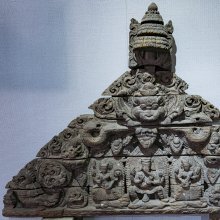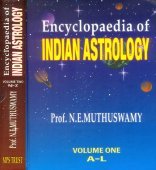Vastu, Vāstu: 37 definitions
Introduction:
Vastu means something in Buddhism, Pali, Hinduism, Sanskrit, Jainism, Prakrit, the history of ancient India, Marathi, Hindi, biology, Tamil. If you want to know the exact meaning, history, etymology or English translation of this term then check out the descriptions on this page. Add your comment or reference to a book if you want to contribute to this summary article.
Images (photo gallery)
In Hinduism
Vastushastra (architecture)
Source: Wisdom Library: Vāstu-śāstraVāstu (वास्तु) is a Sanskrit technical term denoting a “residence” in general, according to the lists of synonyms given in the Mayamata XIX.10-12, which is a populair treatise on Vāstuśāstra literature.
Source: The India Center: Architecture (Vastu Shastra)The Sanskrit word Vastu means a dwelling or house. The Vastu, takes the meaning of “the site or foundation of a house, site, ground, building or dwelling-place, habitation, homestead, house”. The underlying root is Vas “to dwell, live, stay, abide”.
Source: McGill: The architectural theory of the MānasāraVāstu (वास्तु).—Chapter III of the Mānasāra recounts that the wise sages “identified” locales that were fit for the dwelling of gods and humans. They called these sites vāstu, the primal architectural “object”, which, by creative intervention of humans, was to be transformed into vāstu, “dwelling”. Sacred architecture begins, thus, by perceiving divine presence at a particular location.
Source: OpenEdition books: Architectural terms contained in Ajitāgama and RauravāgamaVastu (वस्तु) refers to “habitat (in the broad sense of the word) § 2.6.”.—(For paragraphs cf. Les enseignements architecturaux de l'Ajitāgama et du Rauravāgama by Bruno Dagens)

Vastushastra (वास्तुशास्त्र, vāstuśāstra) refers to the ancient Indian science (shastra) of architecture (vastu), dealing with topics such architecture, sculpture, town-building, fort building and various other constructions. Vastu also deals with the philosophy of the architectural relation with the cosmic universe.
Ayurveda (science of life)
Source: Wisdom Library: Āyurveda and botanyVāstu (वास्तु) is another name (synonym) for Vāstūka, which is a Sanskrit name for the plant Chenopodium album (lamb’s quarters). This synonym was identified by Narahari in his 13th-century Rājanighaṇṭu (verses 7.122-123), which is an Ayurvedic medicinal thesaurus.

Āyurveda (आयुर्वेद, ayurveda) is a branch of Indian science dealing with medicine, herbalism, taxology, anatomy, surgery, alchemy and related topics. Traditional practice of Āyurveda in ancient India dates back to at least the first millenium BC. Literature is commonly written in Sanskrit using various poetic metres.
Purana and Itihasa (epic history)
Source: Cologne Digital Sanskrit Dictionaries: The Purana Index1) Vastu (वस्तु).—A son of Lomapāda.*
- * Vāyu-purāṇa 95. 37.
2) Vāstu (वास्तु).—Rules of Śilpaśāstra. According to these Kṛṣṇa built a city (Dvārakā) in the sea.*
- * Bhāgavata-purāṇa X. 50. 50-51.
Vāstu (वास्तु) refers to the name of a River mentioned in the Mahābhārata (cf. VI.10.24). Note: The Mahābhārata (mentioning Vāstu) is a Sanskrit epic poem consisting of 100,000 ślokas (metrical verses) and is over 2000 years old.

The Purana (पुराण, purāṇas) refers to Sanskrit literature preserving ancient India’s vast cultural history, including historical legends, religious ceremonies, various arts and sciences. The eighteen mahapuranas total over 400,000 shlokas (metrical couplets) and date to at least several centuries BCE.
Natyashastra (theatrics and dramaturgy)
Source: Wisdom Library: Nāṭya-śāstra1) Vastu (वस्तु, “plot”) refers to the “subject-matter” of a dramatic play (nāṭya), also known as Itivṛtta, according to the Nāṭyaśāstra chapter 20-21. The subject-matter (vastu) of a Nāṭaka may be twofold:
- “The principal” (ādhikārika)
- and the “incidental” (prāsaṅgika)
The meaning of the principal Plot is obvious from its name, and an incidental Plot is that in which the characters acting in their own interest incidentally further the purpose of the Hero of the principal Plot.
2) Vastu (वस्तु) refers to one of the twenty aspects of tāla (time-measure), according to the Nāṭyaśāstrahapter chapter 28. In musical performance, tāla refers to any rhythmic beat or strike that measures musical time. It is an important concept in ancient Indian musical theory (gāndharvaśāstra) traceable to the Vedic era.
3) Vastu (वस्तु) refers to the “theme” of songs (dhrūva) according to the Nāṭyaśāstra 32.400:—“the theme (vastu) arises from a locality, and may relate to a city or a forest”.
Vastu is a technical word meaning principal parts of songs. This is probably equivalent to what the singers of North India call tuk in connexion with Dhrupada songs. See Gītasūtrasāra (Bengali). p. 78. This word (Vastu) has been used by Kālidāsa (Mālavi. II. 0. 5; 3.1; 4.1.) It also means a song, and is equivalent to the term. cīj. (lit. thing) used by the modern North Indian singers. See Śārṅgadeva’s Saṃgītaratnākara V. 6; V. 61ff.
2)
Vastu (वस्तु, “a thing”).—Something which is exclusively composed of regular words and musical metre is called a vastu (lit, “thing”). One should known that prabandha, vastu and rūpaka are the three names of composed music (nibaddha) based on regular words (pada) and the other phrasal elements (aṅga). (cf. Saṅgītaśiromaṇi 13.6)

Natyashastra (नाट्यशास्त्र, nāṭyaśāstra) refers to both the ancient Indian tradition (shastra) of performing arts, (natya—theatrics, drama, dance, music), as well as the name of a Sanskrit work dealing with these subjects. It also teaches the rules for composing Dramatic plays (nataka), construction and performance of Theater, and Poetic works (kavya).
Shaktism (Shakta philosophy)
Source: Google Books: Manthanabhairavatantram1) Vastu (वस्तु) refers to the “subtle reality”, according to Tantric texts such as the Kubjikāmata-tantra, the earliest popular and most authoritative Tantra of the Kubjikā cult.—Accordingly, as Bhairava says to the Goddess: “[...] I have told you about Khañjinī repeatedly, again and again. Khañjikā, who is in the subtle (reality) within the subtle reality (vastu), is so called because the universe is within her and she is in the midst of the universe”.
2) Vastu (वस्तु) (Cf. Samāveśa) refers to “reality” according to Abhinava’s Tantrāloka (verse 1.167-170), while quoting his Mālinīvijayottaratantra (verse 2.21-23).—Accordingly, “The three (ways in which impurity is eradicated) was taught by the Supreme Lord in the Mālinīvijayottaratantra in the course of explaining (the forms) of penetration (into the supreme state) (samāveśa). [...] That penetration attained by conceiving reality (vastu) by the mind alone, devoid of the utterance of mantra (uccāra), is here said to be the one pertaining to Śakti (śākta). [...]”.
Source: JSTOR: Tāntric Dīkṣā by Surya KantaVāstu (वास्तु) is the name of a prodigious demon, who was killed by 53 gods. These gods are worshipped and bali-offerings are given to them. (see Balimaṇḍapa, ‘a temporary hall created for ceremonial occasions’).

Shakta (शाक्त, śākta) or Shaktism (śāktism) represents a tradition of Hinduism where the Goddess (Devi) is revered and worshipped. Shakta literature includes a range of scriptures, including various Agamas and Tantras, although its roots may be traced back to the Vedas.
Vaishnavism (Vaishava dharma)
Source: Pure Bhakti: Brhad BhagavatamrtamVastu (वस्तु) refers to:—Thing, existent object. (cf. Glossary page from Śrī Bṛhad-bhāgavatāmṛta).

Vaishnava (वैष्णव, vaiṣṇava) or vaishnavism (vaiṣṇavism) represents a tradition of Hinduism worshipping Vishnu as the supreme Lord. Similar to the Shaktism and Shaivism traditions, Vaishnavism also developed as an individual movement, famous for its exposition of the dashavatara (‘ten avatars of Vishnu’).
Kavyashastra (science of poetry)
Source: Shodhganga: Bhismacaritam a critical studyVastu (वस्तु, “plot”) refers to one of the primary or the principal characteristics of a Mahākāvya (‘epic poem’).—Plot or Vastu is the foundation of a Mahākāvya. It is an aggregate of all incidents and episodes brought home to the reader. [...] The plot of a Mahākāvya, on the whole consists essentially of the five elements of the story, five stages of actions, and five junctures with its various sub-divisions.

Kavyashastra (काव्यशास्त्र, kāvyaśāstra) refers to the ancient Indian tradition of poetry (kavya). Canonical literature (shastra) of the includes encyclopedic manuals dealing with prosody, rhetoric and various other guidelines serving to teach the poet how to compose literature.
Shaivism (Shaiva philosophy)
Source: Brill: Śaivism and the Tantric Traditions (philosophy)Vastu (वस्तु) refers to “reality”, according to Utpaladeva’s Vivṛti on Īśvarapratyabhijñākārikā 1.5.6.—Accordingly, “To begin with, as far as agents of ordinary human practice are concerned, it is on [the basis of] mere phenomena that [they] manage to an ascertainment in which [they necessarily] engage [in their ordinary activities]; so this pondering over an unperceived reality (adṛṣṭavastu) that is [supposedly] something more [than phenomena and the consciousness manifesting them] is a [purely] arbitrary endeavour! [...]”.

Shaiva (शैव, śaiva) or Shaivism (śaivism) represents a tradition of Hinduism worshiping Shiva as the supreme being. Closely related to Shaktism, Shaiva literature includes a range of scriptures, including Tantras, while the root of this tradition may be traced back to the ancient Vedas.
In Buddhism
Mahayana (major branch of Buddhism)
Source: Wisdom Library: Maha Prajnaparamita SastraVastu (वस्तु) refers to “objects”, according to Mahāprajñāpāramitāśāstra (chapter 41).—Accordingly, “[The Non-existence of Time According to the Mahāyāna].—[...] Thus the moon (candra) moistens objects (vastu) and the sun (sūrya) ripens them, and thanks to this twofold action, everything prospers. The path of merit and the path of wisdom do the same: the path of merit gives rise to qualities (guṇa), and the path of wisdom, acting on the path of merit, expels attachment to wrong views. This is why, although he preaches the limitless emptiness of dharmas, the Buddha also speaks of his unhindered penetration of the three times; there is nothing wrong in this. [...]”.
Source: academia.edu: A Study and Translation of the GaganagañjaparipṛcchāVastu (वस्तु) refers to “things”, according to the Gaganagañjaparipṛcchā: the eighth chapter of the Mahāsaṃnipāta (a collection of Mahāyāna Buddhist Sūtras).—Accordingly, “Son of good family, there are eight patiences reflecting on the dharma of the Bodhisattvas. What are the eight? [...] the patience without birth since characters are unconditioned; (6) the patience without origination since there is no arising and abiding; (7) the patience without being (niḥsatva) since there is no destruction of things (vastu); (8) patience truly as it is since there is no destruction by time. Son of good family, those eight are the patiences reflecting on the dharma of the Bodhisattvas”.

Mahayana (महायान, mahāyāna) is a major branch of Buddhism focusing on the path of a Bodhisattva (spiritual aspirants/ enlightened beings). Extant literature is vast and primarely composed in the Sanskrit language. There are many sūtras of which some of the earliest are the various Prajñāpāramitā sūtras.
Buddhist philosophy
Source: Google Books: The Treasury of Knowledge: Book six, parts one and two (philosophy)Vastu (वस्तु) (Sanskrit; in Tibetan: dngos po) refers to “substantial objects”, representing one of the six types of “objects” (viṣaya) (i.e., ‘that which is to be comprehended or known’).—Accordingly, “That which is to be understood through valid cognition is ‘the knowable’. The terms ‘object’ (viṣaya; yul), ‘knowable’ (jñeya; shes bya), and ‘appraisable’ (prameya; gzhal bya) are all essentially equivalent, but it is the defining characteristic of the ‘object’ that it is to be comprehended or known, [...]. When objects (viṣaya) are analyzed in terms of their essential nature, they may be: [i.e., “substantial objects” (vastu; dngos po) are causally effective (arthakriyākāraṇa; don byed nus pa);] [...]
-
Tibetan Buddhism (Vajrayana or tantric Buddhism)
Source: Brill: Śaivism and the Tantric Traditions (tantric Buddhism)Vāstu (वास्तु) refers to a “site” (of building construction), according to the Bhūśalyasūtrapātananimittavidhi section of Jagaddarpaṇa’s Ācāryakriyāsamuccaya, a text within Tantric Buddhism dealing with construction manual for monasteries etc.—Accordingly, “[...] If a cord is stepped over by a specific kind of creature, then there must be a bone of that creature beneath the site (vāstu) on which the cord is being cast. [...]”.

Tibetan Buddhism includes schools such as Nyingma, Kadampa, Kagyu and Gelug. Their primary canon of literature is divided in two broad categories: The Kangyur, which consists of Buddha’s words, and the Tengyur, which includes commentaries from various sources. Esotericism and tantra techniques (vajrayāna) are collected indepently.
In Jainism
General definition (in Jainism)
Source: archive.org: Jaina YogaVāstu (वास्तु, “houses”) refers to one of the classes of the external (bahya) division of attachment (parigraha) and is related to the Aparigraha-vrata (vow of non-attachment). Vāstu is listed in Śvetāmbara sources such as Devagupta’s Nava-pada-prakaraṇa with Laghu-vṛtti (58), and in Digambara sources such Cāmuṇḍarāya’s Caritrasāra (p. 7).
Houses (vāstu) are of three types:
- excavated (khāta);
- raised (ucchrita);
- a combination of both (khātocchrita).
Vastu (वस्तु) refers to “objects”, according to the 11th century Jñānārṇava, a treatise on Jain Yoga in roughly 2200 Sanskrit verses composed by Śubhacandra.—Accordingly, “Fool, perceiving this multitude of objects (vastu-jāta—vastujātam idaṃ) that is continually transitory and you do not understand. This is a planet without any medicine”.
Synonyms: Padārtha, Pudgala, Mūrta, Pumartha.

Jainism is an Indian religion of Dharma whose doctrine revolves around harmlessness (ahimsa) towards every living being. The two major branches (Digambara and Svetambara) of Jainism stimulate self-control (or, shramana, ‘self-reliance’) and spiritual development through a path of peace for the soul to progess to the ultimate goal.
India history and geography
Source: Cologne Digital Sanskrit Dictionaries: Indian Epigraphical GlossaryVāstu.—(EI 15, 32), homestead land. Note: vāstu is defined in the “Indian epigraphical glossary” as it can be found on ancient inscriptions commonly written in Sanskrit, Prakrit or Dravidian languages.

The history of India traces the identification of countries, villages, towns and other regions of India, as well as mythology, zoology, royal dynasties, rulers, tribes, local festivities and traditions and regional languages. Ancient India enjoyed religious freedom and encourages the path of Dharma, a concept common to Buddhism, Hinduism, and Jainism.
Biology (plants and animals)
Source: Google Books: CRC World Dictionary (Regional names)1) Vastu in India is the name of a plant defined with Chenopodium album in various botanical sources. This page contains potential references in Ayurveda, modern medicine, and other folk traditions or local practices It has the synonym Botrys alba (L.) Nieuwl. (among others).
2) Vastu is also identified with Chenopodium hederiforme It has the synonym Botrys alba (L.) Nieuwl. (etc.).
3) Vastu is also identified with Chenopodium olukondae It has the synonym Chenopodium opulifolium subsp. oluhondae Murray (etc.).
4) Vastu is also identified with Coscinium fenestratum It has the synonym Coscinium fenestratum (Gaertn.) Colebrooke (etc.).
Example references for further research on medicinal uses or toxicity (see latin names for full list):
· Systema Vegetabilium (1820)
· Newslett. Int. Organ. Pl. Biosyst. (Pruhonice) (1999)
· Systema Vegetabilium, ed. 15 (1820)
· Delic. Fl. Faun. Insubr. (1787)
· Institutiones Rei Herbariae (1766)
· Deutsche Botanische Monatsschrift (1901)
If you are looking for specific details regarding Vastu, for example health benefits, pregnancy safety, extract dosage, chemical composition, diet and recipes, side effects, have a look at these references.

This sections includes definitions from the five kingdoms of living things: Animals, Plants, Fungi, Protists and Monera. It will include both the official binomial nomenclature (scientific names usually in Latin) as well as regional spellings and variants.
Languages of India and abroad
Marathi-English dictionary
Source: DDSA: The Molesworth Marathi and English Dictionary1) Vastu (वस्तु).—n (S) A thing in general; any article or substance; any affair, business, or matter. Note. This word will often be used in the feminine gender, and written indifferently with stu & stū. Viewed and written as a Sanskrit word it should always be neuter. 2 The main plot (of a play or poem).
2) vastū (वस्तू).—f (vastu S) An article or a thing in general.
vastū.—prep (vastu S) By: noting the agent. Ex. mājhēvastū hōīla -jāvēla -hōta nāhīṃ -karavata nāhīṃ.
vāstu.—n f S A house or habitation; a place of abode.
vāstu.—ind The sign of the third case, answering to nēṃ or By.
3) vāstū (वास्तू).—ind By. See vāstu ind.
Source: DDSA: The Aryabhusan school dictionary, Marathi-English1) Vastu (वस्तु).—f A thing in general; an article.
2) vastū (वस्तू).—f A thing in general; an article.
3) vāstu (वास्तु).—n f A house; a place of abode.
4) vāstū (वास्तू).—f Ceremonies towards the composing of evil spirits observed on entering into a new house.
Marathi is an Indo-European language having over 70 million native speakers people in (predominantly) Maharashtra India. Marathi, like many other Indo-Aryan languages, evolved from early forms of Prakrit, which itself is a subset of Sanskrit, one of the most ancient languages of the world.
Sanskrit dictionary
Source: DDSA: The practical Sanskrit-English dictionaryVastu (वस्तु).—n. [vas-tun Uṇādi-sūtra 1.71]
1) A really existing thing, the real, a reality; वस्तुन्यवस्त्वारोपोऽज्ञानम् (vastunyavastvāropo'jñānam)
2) A thing in general, an object, article, substance, matter; अथवा मृदु वस्तु हिंसितुं मृदुनैवारभते कृतान्तकः (athavā mṛdu vastu hiṃsituṃ mṛdunaivārabhate kṛtāntakaḥ) R.8.45; किं वस्तु विद्वन् गुरवे प्रदेयम् (kiṃ vastu vidvan gurave pradeyam) 5.18;3.5; वस्तुनीष्टेऽप्यनादरः (vastunīṣṭe'pyanādaraḥ) S. D.
3) Wealth, property, possessions.
4) Essence, nature, natural or essential property.
5) Stuff (of which a thing in made), materials, ingredients (fig. also); आकृतिप्रत्ययादेवैनामनूनवस्तुकां संभावयामि (ākṛtipratyayādevaināmanūnavastukāṃ saṃbhāvayāmi) M.1.
6) The plot (of a drama), the subjet-matter of any poetic composition; कालिदासग्रथितवस्तुना नवेनाभिज्ञानशकुन्तलाख्येन नाटकेनोप- स्थातव्यमस्माभिः (kālidāsagrathitavastunā navenābhijñānaśakuntalākhyena nāṭakenopa- sthātavyamasmābhiḥ) Ś.1; अथवा सद्वस्तुपुरुषबहुमानात् (athavā sadvastupuruṣabahumānāt) V.1.2; आशीर्नमस्क्रियावस्तुनिर्देशो वापि तन्मुखम् (āśīrnamaskriyāvastunirdeśo vāpi tanmukham) S. D.6; Ve.1; Rām.1.3.1.
7) The pith of a thing.
8) A plan, design.
9) (In music) A kind of composition. -f. Ved. A day (?)
--- OR ---
Vāstu (वास्तु).—m., n. [vas-tuṇ Uṇādi-sūtra 1.77]
1) The site of a house, building ground, site.
2) A house, an abode, a dwelling-place; रवेरविषये वास्तु किं न दीपः प्रकाशयेत् (raveraviṣaye vāstu kiṃ na dīpaḥ prakāśayet) Subhāṣ.
3) A chamber.
Source: Cologne Digital Sanskrit Dictionaries: Edgerton Buddhist Hybrid Sanskrit DictionaryVastu (वस्तु).—nt. (semi-MIndic, = Sanskrit vāstu; Sanskrit vastu in this sense noted only in vraṇa-v°, Sitz, Ort einer Wunde, [Boehtlingk and Roth]; in Pali vatthu = Sanskrit vastu and vāstu), site, place: etasmiṃ…pṛthivīpradeśe bhagavato Kāśyapasya āgama- (? v.l. āramana-; Senart's note em. ārāma-)-vastuṃ abhūṣi Mahāvastu i.318.7;…Kāśyapasya kuṭī-vastu (v.l. °vastum) abhūṣi 9, the site of the hut of K.; ṛṣiṇā taṃ vastuṃ teṣāṃ …dinnaṃ i.352.3, the ṛṣi (Kapila) gave them the site (on which they were to build the city called, for this reason, Kapila-vastu, q.v.). Also in i.318.10, parallel to 7 and 9 above, I would read caṅkrama-vastu for text °ṣaṣṭiḥ (rather than °bhūmiḥ with Senart's note). [In Lalitavistara 106.18 śuci-gātra-vastu-saṃpannaḥ read with v.l. vastra for vastu; so Tibetan, perfect in having clean garments (na bzaḥ) on his body.]
Source: Cologne Digital Sanskrit Dictionaries: Shabda-Sagara Sanskrit-English DictionaryVastu (वस्तु).—n. (-stu) 1. Thing, matter, substance. 2. Natural disposition, essential property, nature, essence. 3. The pith or substance of any thing. 4. The main plot or subject of a poem or play. 5. The rear. E. vas to abide, Unadi aff. tun .
--- OR ---
Vāstu (वास्तु).—mn. (-stuḥ-stu) 1. The site of a habitation. 2. A house, a habitation. E. vas to dwell, Unadi aff. tun, and the radical vowel made long.
Source: Cologne Digital Sanskrit Dictionaries: Benfey Sanskrit-English DictionaryVastu (वस्तु).—[vas + tu] 1., n. 1. Natural disposition. 2. Essence, the true object, [Vedāntasāra, (in my Chrestomathy.)] in
--- OR ---
Vāstu (वास्तु).— (vb. 1. vas), m. and n. 1. The site of a building, a building-place. 2. Ground, [Mānavadharmaśāstra] 3, 255. 3. A house.
Source: Cologne Digital Sanskrit Dictionaries: Cappeller Sanskrit-English DictionaryVastu (वस्तु).—1. [feminine] brightening, dawning; [genetive] vastos in the morning, prati vastos towards morning.
--- OR ---
Vastu (वस्तु).—2. [neuter] seat, place; thing, object, reality; matter, circumstance; substance, contents or subject (of a poem etc.).
--- OR ---
Vāstu (वास्तु).—[neuter] ([masculine]) dwelling, home.
Source: Cologne Digital Sanskrit Dictionaries: Monier-Williams Sanskrit-English Dictionary1) Vastu (वस्तु):—[from vas] 1. vastu f. (for 2. See p. 932, col. 3) becoming light, dawning, morning, [Ṛg-veda; Vājasaneyi-saṃhitā] ([genitive case] vastoḥ, in the m°; vastor vastoḥ, every m°; vastor asyāḥ, this m°; prati vastoḥ, towards m°; [dative case] vastave See under √2. vas).
2) [from vas] 2. vastu n. (for 1. See p. 931, col. 3) the seat or place of (See kapila-, vraṇa-v)
3) [v.s. ...] any really existing or abiding substance or essence, thing, object, article, [Kāvya literature; Varāha-mihira’s Bṛhat-saṃhitā; Kathāsaritsāgara] etc. (also applied to living beings e.g. [Śakuntalā ii, 7/8])
4) [v.s. ...] (in [philosophy]) the real (opp. to a-v, ‘that which does not really exist, the unreal’; a-dvitīya-v, ‘the one real substance or essence which has no second’), [Indian Wisdom, by Sir M. Monier-Williams 53 n. 1; 103] etc.
5) [v.s. ...] the right thing, a valuable or worthy object, object of or for ([compound]), [Kāvya literature]
6) [v.s. ...] goods, wealth, property (cf. -vinimaya and -hāni)
7) [v.s. ...] the thing in question, matter, affair, circumstance, [Mahābhārata; Kāvya literature] etc.
8) [v.s. ...] subject, subject-matter, contents, theme (of a speech etc.), plot (of a drama or poem), [Kāvya literature; Daśarūpa; Sāhitya-darpaṇa] etc.
9) [v.s. ...] (in music) a kind of composition, [Saṃgīta-sārasaṃgraha]
10) [v.s. ...] natural disposition, essential property, [Horace H. Wilson]
11) [v.s. ...] the pith or substance of anything, [Horace H. Wilson]
12) a 1. 2. vastu. See pp. 931 and 932.
13) Vāstu (वास्तु):—[from vāstava] n. (m. only in [Bhāgavata-purāṇa]) the site or foundation of a house, site, ground, building or dwelling-place, habitation, homestead, house, [Ṛg-veda] etc. etc.
14) [v.s. ...] an apartment, chamber, [Varāha-mihira’s Bṛhat-saṃhitā]
15) [v.s. ...] m. Name of one of the 8 Vasus, [Bhāgavata-purāṇa]
16) [v.s. ...] of a Rākṣasa, [Catalogue(s)]
17) [v.s. ...] ([probably]) f. Name of a river, [Mahābhārata]
18) [v.s. ...] n. the pot-herb Chenopodium Album, [cf. Lexicographers, esp. such as amarasiṃha, halāyudha, hemacandra, etc.]
19) [v.s. ...] a kind of grain, [Āpastamba-śrauta-sūtra [Scholiast or Commentator]] (cf. -maya).
Source: Cologne Digital Sanskrit Dictionaries: Yates Sanskrit-English Dictionary1) Vastu (वस्तु):—(stu) 2. n. Thing, substance; nature, scheme of a play.
2) Vāstu (वास्तु):—[(stuḥ-stu)] 2. m. n. The site of a habitation; a house.
Source: DDSA: Paia-sadda-mahannavo; a comprehensive Prakrit Hindi dictionary (S)Vastu (वस्तु) in the Sanskrit language is related to the Prakrit word: Vatthu.
[Sanskrit to German]
Sanskrit, also spelled संस्कृतम् (saṃskṛtam), is an ancient language of India commonly seen as the grandmother of the Indo-European language family (even English!). Closely allied with Prakrit and Pali, Sanskrit is more exhaustive in both grammar and terms and has the most extensive collection of literature in the world, greatly surpassing its sister-languages Greek and Latin.
Hindi dictionary
Source: DDSA: A practical Hindi-English dictionary1) Vastu (वस्तु):—(nf) an article, thing; object; substance, material; action/plot of a drama; content; -[jagata] substantial world, phenomenal world; -[jñāna] knowledge of the essentials; -[nirdeśa] an inkling of the plot; ~[niṣṭha] objective; ~[niṣṭhatā] objectivity; ~[niṣṭhatāvāda, ~niṣṭhāvāda] objectivism; positivism; -[racanā] plot structure; ~[vāda] objectivism; objectivity; ~[vādī] an objectivist; objectivistic; -[vinimaya] barter, exchange; •[vyavasthā] barter system; ~[sthiti] reality, real position, actual state of things.
2) Vāstu (वास्तु):—(nm) building; -[karma] building work; -[kalā] architecture; —[jñāna] architecture, architectural know-how; -[vidyā/śāstra] the science of architecture; -[śilpa] architecture.
...
Kannada-English dictionary
Source: Alar: Kannada-English corpusVastu (ವಸ್ತು):—
1) [noun] any physical, tangible object.
2) [noun] riches; wealth; worldly possessions.
3) [noun] gold.
4) [noun] the fact of being in existence.
5) [noun] that which makes something what it is; intrinsic, fundamental nature or most important quality (of something); essential being.
6) [noun] the essence, summary.
7) [noun] the structure of a musical composition.
8) [noun] (phi.) the individual soul or the Supreme Soul.
9) [noun] (jain.) a division of a treatise; a chapter.
10) [noun] (fig.) a very dear person.
--- OR ---
Vāstu (ವಾಸ್ತು):—
1) [noun] a small area or ground fit for constructing a building; a site; a plot.
2) [noun] a building sutiable for living in; a residence; a house.
3) [noun] a man who owns or maintains a house; a house-holder.
4) [noun] the art and science of construction of buildings which includes architecture and sculpture.
Kannada is a Dravidian language (as opposed to the Indo-European language family) mainly spoken in the southwestern region of India.
Nepali dictionary
Source: unoes: Nepali-English Dictionary1) Vastu (वस्तु):—n. 1. a really existing things; a reality; 2. a thing in general; an object; article; substance; matter; 3. wealth; property; possessions; 4. essence; nature; essential property; 5. materials; ingredients; 6. subject matter; 7. plan; design; plot; 8. the animals; 9. the abbreviated name of archeological objects;
2) Vāstu (वास्तु):—n. 1. the site of a house; building ground; site; 2. foundation; 3. a house; an abode; a dwelling place; 4. architecture;
Nepali is the primary language of the Nepalese people counting almost 20 million native speakers. The country of Nepal is situated in the Himalaya mountain range to the north of India.
See also (Relevant definitions)
Starts with (+202): Vaastukarm, Vastu-bhumi, Vastu-kritya, Vastu-kshetra-jaladhara-garta-marga-samanvita, Vastu-parivara, Vastu-prabhritaka, Vastu-purusha-mandal, Vastubahya, Vastubala, Vastubali, Vastubamdha, Vastubandhana, Vastubhamda, Vastubhau, Vastubhava, Vastubheda, Vastubhuta, Vastucakra, Vastucandrika, Vastucanti.
Ends with (+91): Adivastu, Adrishtavastu, Advitiyavastu, Aggalavastu, Ailapailavastu, Akarbanika-vastu, Amtaravastu, Amtarvastu, Anatmavastu, Antarvastu, Apavastu, Ashcaryavastu, Ativastu, Atmavastu, Avastu, Avyakrita-vastu, Bahyavastu, Bhakshyavastu, Bhautavastu, Bhogavastu.
Full-text (+1262): Vatthu, Vastuvidya, Kapilavastu, Vastushanti, Yuddhavastu, Vastushastra, Vastuvidhana, Vastujnana, Vastutattva, Vastukala, Vastuvicara, Vastukrita, Vastuyaga, Vastubhuta, Sauvastava, Shubhavastu, Vastupala, Vastuhani, Vastupurusha, Vastutas.
Relevant text
Search found 133 books and stories containing Vastu, Vāstu, Vastū, Vāstū, Vaastu, Vasthu, Vaasthu, Vasdu, Vasdhu; (plurals include: Vastus, Vāstus, Vastūs, Vāstūs, Vaastus, Vasthus, Vaasthus, Vasdus, Vasdhus). You can also click to the full overview containing English textual excerpts. Below are direct links for the most relevant articles:
Sahitya-kaumudi by Baladeva Vidyabhushana (by Gaurapada Dāsa)
Text 4.87 < [Chapter 4 - First-rate Poetry]
Text 4.77 < [Chapter 4 - First-rate Poetry]
Text 4.62 < [Chapter 4 - First-rate Poetry]
Vernacular architecture of Assam (by Nabajit Deka)
Development (c): Aryan Influence < [Chapter 3]
Architecture (f): Site Selection < [Chapter 3]
Techniques (f): Pre-measures of Construction < [Chapter 4]
Gati in Theory and Practice (by Dr. Sujatha Mohan)
Literary and dramatic elements in Nāṭyaśāstra < [Chapter 1 - Nāṭya]
Gati performed in Dhruvā-gāna < [Chapter 3 - Application of gati in Dṛśya-kāvyas]
Gati performed in Nṛtta < [Chapter 3 - Application of gati in Dṛśya-kāvyas]
Natyashastra (English) (by Bharata-muni)
Chapter XXXI - On the Time-measure (tāla)
Chapter IV - Description of the Class Dance (tāṇḍava)
Vastu-shastra (1): Canons of Architecture (by D. N. Shukla)
(ii) The Architecture (Sthāpatya) < [Chapter 3 - The Architect and Architecture]
(ii) The Site-planning (Vāstupada-vīnyāsa) < [Chapter 6 - Fundamental Canons of Hindu Architecture]
(iv.b) Aparājitapṛcchā (Subject-matter and Creation) < [Chapter 5 - Study of Hindu Science of Architecture]
Maha Prajnaparamita Sastra (by Gelongma Karma Migme Chödrön)
Puṇyakriyāvastu: preliminary note < [Part 5 - Establishing beings in the puṇyakriyāvastus]
Bodhisattva quality 14: skilled in teaching dependent origination < [Chapter X - The Qualities of the Bodhisattvas]
Bhūmi 5: the ground difficult to conquer (sudurjayā) < [Chapter XX - (2nd series): Setting out on the Mahāyāna]
Related products






